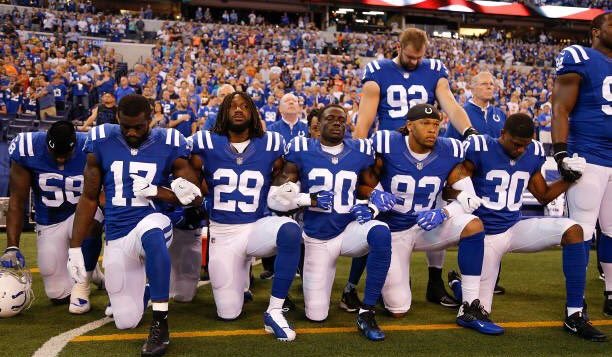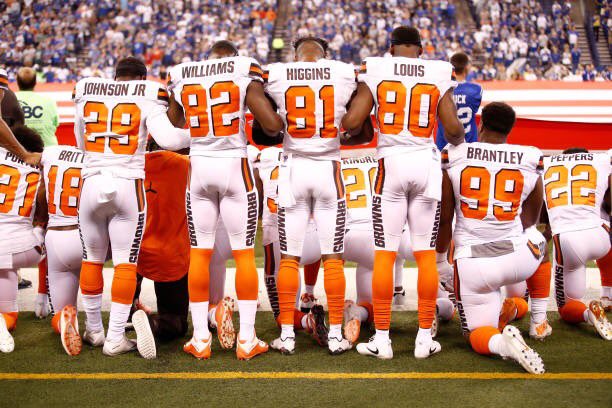Home of the Brave
3By Harbour Heather
 More than greasy cheeseburgers, more than reality TV. Even more than guns. Americans love their sport. Football especially is in the blood of the nation; it’s what their weekends and high school social hierarchies are built upon.
More than greasy cheeseburgers, more than reality TV. Even more than guns. Americans love their sport. Football especially is in the blood of the nation; it’s what their weekends and high school social hierarchies are built upon.
Over the weekend, the President of the United States of America shone a light on football, and he didn’t like what the Friday Night Lights reflected back.
Dozens of players and management officials, even anthem singers, were taking knees or remaining in the locker rooms during the national anthem, in response to Trump calling protesting players “son(s) of a bitch” and for them to be fired. The man who refused to denounce violent fascists and repealed medical care from millions called the protests disrespectful to everything the flag and country stands for.
Great solidarity for our National Anthem and for our Country. Standing with locked arms is good, kneeling is not acceptable. Bad ratings!
— Donald J. Trump (@realDonaldTrump) September 24, 2017
Bad ratings. That’s the type of comment you get on a serious nationwide social issue from a reality TV star who is out to stroke his own ego.
This is not the first time sport and politics have collided, history is riddled with examples. Nor will it be the last. In the pressure cooker environment that is the United States at the moment, there is no neutral territory. People are either very much in support of Trump or very much against him. Since he took office, several players in the Super Bowl-winning New England Patriots refused to travel to their celebratory function at the White House. Trump retracted his invitation to the entire Golden State Warriors championship side after Steph Curry publicly discussed his reluctance to attend.
In general, the NFL is a place where racial tensions are put aside – where white supremacists are happy to celebrate players of colour if they bring home a SuperBowl. When Colin Kaepernick kneeled during The Star Spangled Banner last year to highlight police brutality against people of colour, some players joined him, some were sympathetic to his cause but not his execution, and others believed there was no issue to highlight. Kaepernick quickly became the most infamous player in the league, and is currently a free agent – the belief that his vocal activism was a deterrent for teams wanting to avoid controversy, and related sponsorship fallout.
But what place politics in sport? Or sport in politics?
There’s a legitimate claim that sportspeople should leave their politics at home. Emotions run high on controversial issues, and players, teams, organisations and governing bodies can lose loyal supporters for a stance on either side of a hot topic. Our Aussie neighbours are seeing this currently, with Israel Falou and the AFL copping flack for their opposing stances on the upcoming same-sex marriage vote.
Sport should be a place where people can come together, and forget their differences for two halves, four quarters, three sets or five days. It should be a way of celebrating talent, fair competition and the best of the human spirit. But sport is made up of humans, and humans have opinions, and voices.
Our recent election spurred thousands of tweets, Facebook posts and updated profile pictures, clearly indicating where loyalties lay. Sportspeople are citizens and not immune to the result of political decisions, and using their platform to share their message only reflects what wider society practises.
Sport may bring politics before people otherwise unaffected, or otherwise uneducated. When children see sporting idols taking a knee or wearing an armband, they may ask questions about the particular issue at hand, but what they’re really learning is this: you stand up for what you believe in, and you fight for what’s right. Who would deny that lesson? It’s up to parents to educate their children on the issue, but to support and appreciate the opportunity to make one’s voice heard.
When sportspeople make bad judgements, or bring a brand into disrepute, many are quick to say we should not be holding sports stars to more than they are – young people who are susceptible to mistakes. Real people, not heroes or moral deities. If we wish to humanise them in this aspect, we must also understand that they are within their rights to have and voice their opinions – especially when in support of worthy causes – and that they are responsible for any repercussions.
Back to America.
No President has jurisdiction over players being cut from teams over a difference of opinion. Trump’s comments have brought many in the NFL together – including wealthy owners who may have supported him in the past. His irrational, ill-thought outbursts have reached an arena of American life which has a wide impact. People who could turn a blind eye to the Muslim ban, to the wall, to the ridiculing of disabled and violent race riots because it wasn’t in their backyard are seeing this play out on their TV screens. Some are in support. Some are against the players’ actions and are calling for a boycott of the NFL until kneelers are removed.
As he opens the papers tomorrow and sees his name spread throughout, Trump will no doubt be pleased with himself. But what he doesn’t realise is that he’s done what Kaepernick was wanting all along – he’s generated the conversation. And sport was the vehicle.
Land of the free? That’s what’s being debated here, both in civil rights and the right to free speech. Home of the brave? One thing is for certain – those taking a knee are showing more backbone and bravery than Trump ever has, or ever will.
Follow Heather on Twitter


Exceptional piece of writing! Crikey, the rest of us amateur wordsmiths (and a few pros) may as well pack up and go home lol
Thanks Paul! And no way – I just had a lot of thoughts on this one so was pretty easy to put together!!
Oh, you modest, understated Kiwi you. It’s brilliant Heather!